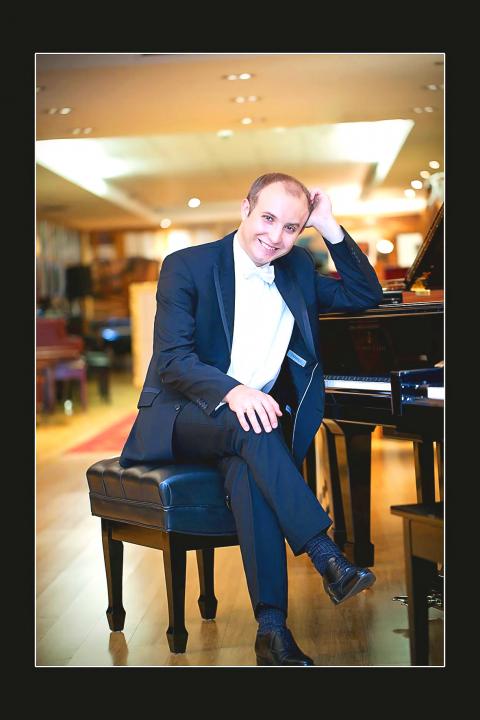There are performers and there are performers. Young classical pianists who win major prizes and are taken up by recording companies aren’t exactly thin on the ground, and some subsequently fall by the wayside. But there does seem to be something special about Alexander Gavrylyuk, the 26-year-old Ukrainian now resident in Australia who’s giving a solo performance in Taipei on Wednesday.
Two facts mark him out. One is that he won the prestigious Arthur Rubinstein piano competition in 2005. Even more remarkable, though, is that he’s soon due to release Prokofiev’s five piano concertos with the Sydney Symphony Orchestra, conducted by none other than Vladimir Ashkenazy.
Ashkenazy has been developing a long-term relationship with the Sydney instrumentalists recently and must have been the deciding voice in choosing Gavrylyuk for such an important recording project. Seeing that Ashkenazy is himself one of the greatest living pianists, the compliment could hardly be greater.

Photo Courtesy Of New Aspect
Reviews are difficult things to assess as their subjects will almost always only display favorable comment. Nevertheless, Gavrylyuk has garnered some exceptional praise, with the stress being on his passionate commitment and technical virtuosity, as well as the electrifying effect the combination has had on audiences.
In Taipei he’ll be playing a varied program beginning with Beethoven’s Pathetique sonata and going on to pieces by Chopin, Liszt and Stravinsky. He’ll end with three preludes by Rachmaninoff, complex works that each contain a miniature drama of a kind. He’ll also give a master class while in Taiwan.
Alexander Gavrylyuk plays at Taipei’s National Concert Hall on Wednesday at 7:30pm. Tickets are NT$400 to NT$2,000. For reservations call (02) 3393-9888 or go to www.artsticket.com.tw.
Meanwhile in Tainan the Nan-Ying International Music Festival, the first of its kind in the area, draws to its close this weekend. This is a bigger event than you might expect, with artists from Germany (cellist Peter Bruns), Spain (violinist Manuel Briega), France (viola player Pierre Lenert) and the UK (violinist Justine Chen) taking part, alongside established and aspiring local musicians.
Tainan-born pianist Rueibin Chen (陳瑞斌), long resident in Austria, will lead performances in the Tainan County Music Hall and other venues, and has been prominent in organizing the six-day event. Given the tragic fall that’s afflicted Tainan’s most famous son, this could be a regional morale-booster.
For more information, visit 2010music.tnc.gov.tw/program/index.php.

This year will go down in the history books. Taiwan faces enormous turmoil and uncertainty in the coming months. Which political parties are in a good position to handle big changes? All of the main parties are beset with challenges. Taking stock, this column examined the Taiwan People’s Party (TPP) (“Huang Kuo-chang’s choking the life out of the TPP,” May 28, page 12), the Democratic Progressive Party (DPP) (“Challenges amid choppy waters for the DPP,” June 14, page 12) and the Chinese Nationalist Party (KMT) (“KMT struggles to seize opportunities as ‘interesting times’ loom,” June 20, page 11). Times like these can

June 23 to June 29 After capturing the walled city of Hsinchu on June 22, 1895, the Japanese hoped to quickly push south and seize control of Taiwan’s entire west coast — but their advance was stalled for more than a month. Not only did local Hakka fighters continue to cause them headaches, resistance forces even attempted to retake the city three times. “We had planned to occupy Anping (Tainan) and Takao (Kaohsiung) as soon as possible, but ever since we took Hsinchu, nearby bandits proclaiming to be ‘righteous people’ (義民) have been destroying train tracks and electrical cables, and gathering in villages

Dr. Y. Tony Yang, Associate Dean of Health Policy and Population Science at George Washington University, argued last week in a piece for the Taipei Times about former president Ma Ying-jeou (馬英九) leading a student delegation to the People’s Republic of China (PRC) that, “The real question is not whether Ma’s visit helps or hurts Taiwan — it is why Taiwan lacks a sophisticated, multi-track approach to one of the most complex geopolitical relationships in the world” (“Ma’s Visit, DPP’s Blind Spot,” June 18, page 8). Yang contends that the Democratic Progressive Party (DPP) has a blind spot: “By treating any

Swooping low over the banks of a Nile River tributary, an aid flight run by retired American military officers released a stream of food-stuffed sacks over a town emptied by fighting in South Sudan, a country wracked by conflict. Last week’s air drop was the latest in a controversial development — private contracting firms led by former US intelligence officers and military veterans delivering aid to some of the world’s deadliest conflict zones, in operations organized with governments that are combatants in the conflicts. The moves are roiling the global aid community, which warns of a more militarized, politicized and profit-seeking trend